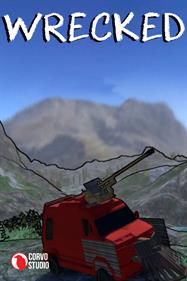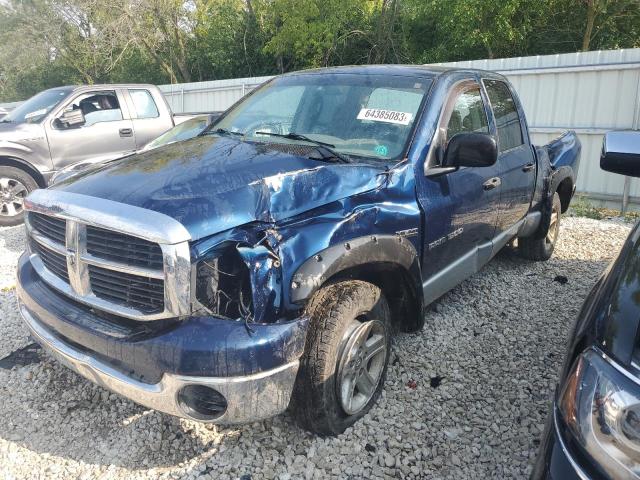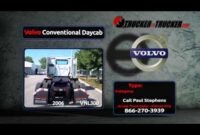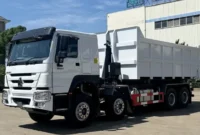Wrecked Box Trucks For Sale: Unlocking Hidden Value pickup.truckstrend.com
In the vast landscape of commercial vehicles, box trucks are indispensable workhorses, serving countless businesses for deliveries, moving, and mobile operations. However, like any vehicle, they are susceptible to accidents, natural disasters, or mechanical failures that can render them "wrecked." While the term "wrecked" often conjures images of irreparable damage, for a savvy buyer, "wrecked box trucks for sale" can represent a unique opportunity. These vehicles, often written off by insurance companies or deemed too costly to repair by their owners, enter a secondary market offering significant savings, valuable parts, or a challenging yet rewarding restoration project. This comprehensive guide will delve into every facet of purchasing wrecked box trucks, from understanding damage levels to navigating the buying process, ultimately helping you unlock the hidden value within these damaged giants.
Understanding "Wrecked": Decoding Damage Levels and Titles
Wrecked Box Trucks For Sale: Unlocking Hidden Value
The term "wrecked" is broad and encompasses a spectrum of damage. Before considering a purchase, it’s crucial to understand the different levels of damage and their implications, particularly concerning vehicle titles.
Types of Damage:
- Collision Damage: The most common form, ranging from minor fender benders to severe structural compromise. This can affect the cab, chassis, engine, or cargo box.
- Mechanical Failure: An engine seizing, transmission failure, or major component breakdown can render a truck inoperable. While not "wrecked" in the traditional sense, it’s often sold as such due to the high repair cost.
- Fire Damage: Can range from minor electrical fires to complete incineration of the cab or cargo area. Fire damage often compromises structural integrity and wiring.
- Flood Damage: Submersion in water, even shallow, can cause extensive damage to electrical systems, interiors, and mechanical components, leading to corrosion and long-term issues.
- Vandalism/Theft Recovery: Less common for total write-offs but can involve significant cosmetic or functional damage from stripped parts or deliberate destruction.
- Hail Damage: While primarily cosmetic, severe hail can total a vehicle if the repair cost exceeds its value, especially for larger surfaces like a box truck’s body.

Vehicle Titles and Their Impact:
The vehicle’s title status is paramount when buying a wrecked truck, as it dictates its future legality and insurability.
- Salvage Issued when an insurance company declares a vehicle a "total loss" because the cost of repairs exceeds a certain percentage (often 70-90%) of its pre-damage value. A salvage title means the vehicle cannot be legally driven on public roads until it’s repaired and inspected.
- Rebuilt/Reconstructed After a vehicle with a salvage title is fully repaired and passes a rigorous state inspection, it may be issued a rebuilt or reconstructed title. This indicates it was once totaled but is now roadworthy. Insurance may still be higher, and resale value lower than a clean-title vehicle.
- Junk/Scrap Some states issue a junk or scrap title for vehicles that are damaged beyond repair and intended only for parts or crushing. These vehicles can never be legally registered or driven.
- Clean Title (with Damage Disclosure): Less common for "wrecked" vehicles, but sometimes a vehicle with significant damage that hasn’t been totaled by insurance might still carry a clean title. In such cases, the seller is legally obligated to disclose all known damage. Always verify the title status before purchase.


The Appeal of Wrecked Box Trucks: Why Consider a Damaged Giant?
Despite the inherent risks, there are compelling reasons why individuals and businesses seek out wrecked box trucks.
- Unbeatable Cost Savings: This is the primary driver. A wrecked box truck can be purchased for a fraction of the cost of a comparable operational truck. This massive upfront saving opens doors for various applications.
- Valuable Parts Source: Even if the entire truck is unsalvageable, many components retain significant value. Engines, transmissions, axles, liftgates, tires, and even specific body panels or interior parts can be salvaged and resold or used to repair another truck. For those running a fleet, a wrecked truck can be a vital donor vehicle, drastically reducing repair costs for other trucks.
- Repair and Resale Potential: For skilled mechanics, body shops, or DIY enthusiasts with the necessary tools and expertise, a wrecked box truck can be a profitable venture. By investing time and effort into repairs, a truck bought for pennies on the dollar can be transformed into a roadworthy vehicle, then sold for a substantial profit.
- Custom Conversion Projects: The spacious, box-like cargo area of these trucks makes them ideal candidates for unique conversions. Imagine a mobile workshop, a food truck, an RV, a tiny home, an off-grid cabin, or a specialized service vehicle. The low purchase price of a wrecked unit frees up budget for the conversion itself.
- Stationary Storage or Utility: For some, the engine and chassis are irrelevant. The box itself can be detached and used as a stationary storage unit, a shed, or even modified into a unique structure on private property.
- Scrap Metal Value: As a last resort, if a truck is truly beyond any other use, its metal content can still fetch a decent price at a scrap yard.
Where to Find Wrecked Box Trucks For Sale
The market for wrecked vehicles is specialized, but several reliable avenues exist for finding these opportunities:
- Online Salvage Auctions:
- Copart and IAAI (Insurance Auto Auctions): These are the two largest public salvage auction platforms in North America. They list thousands of wrecked vehicles daily, including a significant number of box trucks. While some vehicles are restricted to licensed dealers, many are open to the public. Be prepared for bidding wars and understand their fee structures.
- Local Salvage Auctions: Many smaller, regional auction houses specialize in salvaged vehicles. These might offer less selection but potentially lower competition.
- Salvage Yards and Auto Recyclers: Direct sales from salvage yards are common. These businesses often acquire wrecked vehicles from insurance companies or individuals and may have a selection available for parts or complete purchase. Building relationships with local yards can yield good finds.
- Online Marketplaces:
- eBay Motors: Occasionally, individuals or smaller businesses will list wrecked trucks on eBay.
- Craigslist/Facebook Marketplace: Less common for severely wrecked commercial vehicles, but worth checking for private sellers trying to offload a damaged truck. Exercise extreme caution and thoroughly vet sellers.
- Fleet Sales and Dealerships: Sometimes, large fleets or commercial dealerships will sell off damaged trade-ins or vehicles that have reached end-of-life but are still "wrecked" rather than fully operational.
- Government Auctions: Seized or surplus government vehicles, including box trucks, sometimes appear in auctions in various states of disrepair.
Navigating the Purchase Process: A Step-by-Step Guide
Buying a wrecked box truck is not like buying a used car. It requires meticulous planning and due diligence.
- Define Your Purpose and Budget: Before looking, know why you’re buying it (parts, repair, conversion) and your absolute maximum budget, including potential repair costs, transportation, and unforeseen expenses.
- Thorough Research and Inspection:
- Online Listings: Scrutinize all photos and read descriptions carefully. Look for details on damage, mileage, and title status.
- Vehicle History Report: If available, obtain a CarFax or AutoCheck report. While not always complete for commercial vehicles, it can reveal accident history, flood damage, or lien issues.
- In-Person Inspection (Highly Recommended): If at all possible, physically inspect the truck. Bring a knowledgeable mechanic if you’re not one. Look for:
- Frame Damage: Crucial. Bent frames are often irreparable or extremely costly to fix.
- Engine/Transmission Condition: Look for oil leaks, signs of internal damage, or fire damage. If it runs, listen for unusual noises.
- Electrical System: Check wiring, fuse boxes, and signs of water or fire damage.
- Rust: Especially on the chassis, frame, and brake lines.
- Cargo Box Integrity: Cracks, holes, door functionality, liftgate operation (if applicable).
- Fluid Levels: Check for contaminated fluids (water in oil, milky transmission fluid).
- Water Lines: Look for dirt lines or corrosion in the interior or engine bay indicating flood damage.
- Understand Title and Legalities: Confirm the title type. Research your state’s specific requirements for obtaining a rebuilt title if you plan to make it roadworthy. This often involves inspections and additional fees.
- Bidding or Negotiation: Set a firm maximum bid or offer and stick to it. Factor in transportation costs, auction fees, and potential repair expenses. Don’t get caught up in the excitement of an auction.
- Arrange Transportation: A wrecked truck, especially if it’s non-running, cannot be driven away. You’ll need to arrange for a flatbed tow truck or a specialized commercial vehicle transporter. Get quotes in advance, as this can be a significant expense.
- Post-Purchase Planning: Once acquired, decide on your next steps. If repairing, source parts. If converting, start planning the build-out. If scrapping, arrange for a scrap yard pickup.
Key Considerations Before Diving In
- Your Skill Level and Resources: Do you have the mechanical expertise, tools, and time to undertake repairs or a conversion? If not, the cost of professional labor can quickly negate any savings.
- Storage Space: A wrecked box truck is a large item. Do you have adequate, safe space to store it during repairs or disassembly?
- Hidden Damage: This is the biggest risk. What looks like minor damage could hide a catastrophic problem. Always factor in a contingency budget for unforeseen issues.
- Parts Availability and Cost: For older or less common models, finding specific parts can be challenging and expensive. Research parts availability before buying.
- Resale Value Impact: Even with a rebuilt title, a vehicle that was once wrecked will typically have a lower resale value than a clean-title counterpart.
- Safety: Working on damaged vehicles can be dangerous. Be aware of potential hazards like compromised structures, sharp edges, and leaking fluids.
Pricing Guide: Wrecked Box Trucks For Sale (Estimated Ranges)
Prices for wrecked box trucks vary dramatically based on make, model, year, and severity of damage. This table provides estimated ranges for common scenarios. These are not guarantees but rather a general guide.
| Make/Model (Examples) | Year Range | Damage Level | Estimated Price Range (USD) | Common Use Case |
|---|---|---|---|---|
| Ford E-Series, GMC Savana, Isuzu NPR, Hino 195, Freightliner M2 (Class 3-6) | 2005-2015 | Light Collision: Minor body damage, cosmetic, runs/drives. | $2,500 – $7,000 | Repair & Resale, Light Duty Conversion |
| Ford E-Series, GMC Savana, Isuzu NPR, Hino 195, Freightliner M2 (Class 3-6) | 2005-2015 | Moderate Collision: Structural damage (cab/frame), engine/transmission potentially affected, non-running. | $1,000 – $4,000 | Parts Donor, Skilled Repair Project, Conversion |
| Ford E-Series, GMC Savana, Isuzu NPR, Hino 195, Freightliner M2 (Class 3-6) | 2005-2015 | Severe Collision/Rollover: Major structural damage, total loss, engine/transmission likely damaged. | $500 – $2,500 | Primary Parts Donor, Scrap Metal, Extreme Conversion |
| Any Make/Model Box Truck | Any | Fire Damage: Cab or engine compartment fire, extensive wiring/interior damage. | $300 – $2,000 | Parts (non-burnt components), Scrap, Box Body Salvage |
| Any Make/Model Box Truck | Any | Flood Damage: Submerged, electrical/interior likely compromised, engine may be seized. | $200 – $1,500 | Parts (non-electrical), Scrap, Box Body Salvage |
| Any Make/Model Box Truck | 1995-2005 | Older, Moderate Damage: Rust, mechanical issues, non-running. | $100 – $1,000 | Parts Donor (older models), Scrap, Stationary Storage |
| Any Make/Model Box Truck | 2016-Present | Light to Moderate Damage (Newer Model): Potentially high repair cost, but valuable newer parts. | $4,000 – $15,000+ | Repair & Resale (for professionals), Valuable Parts |
Note: These prices do not include auction fees, buyer premiums, transportation costs, or any repair expenses.
Frequently Asked Questions (FAQ)
Q1: What does "salvage title" mean for a box truck?
A1: A salvage title indicates that an insurance company has declared the truck a total loss because the repair cost exceeds a certain percentage of its pre-damage value. It cannot be legally driven until repaired and issued a "rebuilt" title.
Q2: Can I drive a truck with a salvage title on public roads?
A2: No. A salvage title means the vehicle is not roadworthy and cannot be legally registered or driven. It must be repaired, inspected, and issued a rebuilt/reconstructed title before it can be used on public roads.
Q3: How do I transport a wrecked box truck if it’s not running?
A3: You will need to arrange for a heavy-duty flatbed tow truck or a commercial vehicle transport service. These vehicles are too large and heavy for standard car trailers.
Q4: Is it worth repairing a wrecked box truck?
A4: It depends on the extent of the damage, your mechanical skills, and the cost of parts/labor. For minor to moderate damage, or if you have access to affordable parts and labor, it can be very cost-effective. For severe structural or engine damage, it’s often more economical to use it for parts or scrap.
Q5: What are the biggest risks of buying a wrecked truck?
A5: The biggest risks are hidden damage (especially frame or severe electrical/mechanical issues), difficulty in obtaining a rebuilt title (if required), and unexpected repair costs that quickly exceed the truck’s value.
Q6: Where can I find parts for a wrecked box truck?
A6: Parts can be sourced from other salvage yards, online parts suppliers, commercial truck parts dealers, or sometimes directly from the manufacturer. Used parts from donor trucks are often the most cost-effective.
Q7: Are certain brands or models better to buy wrecked than others?
A7: Trucks with widely available parts (e.g., Ford E-Series, Isuzu NPR, Freightliner M2) tend to be easier and cheaper to repair. Simpler mechanical designs can also be advantageous. Less common or highly specialized trucks might pose challenges for parts sourcing.
Conclusion
The market for wrecked box trucks for sale is a niche but potentially lucrative arena for those willing to embrace the challenge. Whether you’re an entrepreneur seeking an affordable platform for a mobile business, a mechanic looking for a profitable repair project, or simply in need of specific components, these damaged giants offer significant untapped potential. Success in this domain hinges on meticulous research, a thorough understanding of damage and title implications, and a realistic assessment of your resources and capabilities. While risks are inherent, a diligent approach can transform a seemingly worthless heap of metal into a valuable asset, proving that sometimes, the greatest opportunities lie in what others have written off.



